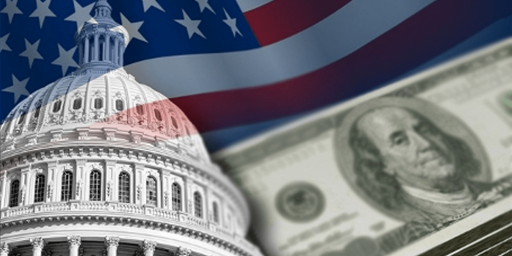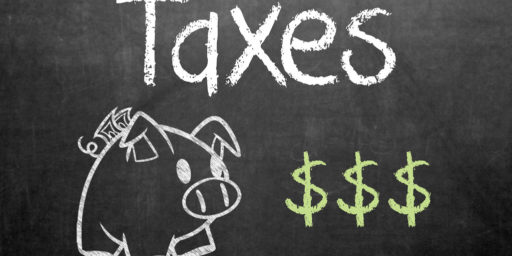Obama’s Irreversible Agenda
 Ross Douthat has discovered Barack Obama’s evil genius:
Ross Douthat has discovered Barack Obama’s evil genius:
What Obama does have, though, is an atmosphere of crisis and a massively-unpopular opposition party, which grants him an unparalleled political opportunity to pass whatever spending the Democratic Party likes, and damn the short-term cost. And what you see in his budgeting proposals, I think, is the liberal equivalent of the conservative attempt to “starve the beast.” In both the Reagan and Bush eras, Republicans passed tax cuts and ran up large deficits while hoping that by starving the federal government of revenue they would curb its long-run growth. Obama’s spending proposals would effectively reverse that dynamic – they would create new spending commitments and run up large deficits, in the hopes that the dollars poured into health care and education will create a new baseline for government’s obligations, which in turn will create the political space for tax increases on the middle class. Like the starve-the-beast approach, the Obama strategy puts off the hard part till tomorrow: Give them tax cuts today, conservatives said, and they’ll swallow spending cuts tomorrow; give them universal health care, universal pre-K, subsidies for green industry and all the rest of it today, liberals seem to be thinking, and they’ll be willing to pay for it tomorrow.
Kevin Drum agrees:
As Bill Kristol knows all too well, social spending programs, once they get started, tend to be pretty popular. The odds of deep sixing, for example, national healthcare after it’s up and running is essentially zero. And once it’s up and running, taxes will follow because most Americans would rather see their taxes go up than their healthcare services go down.
Of course, this mostly applies to broad-based programs. Smaller ones are still hard to get rid of, but not impossible. It’s the bigger ones that become third rails. Both Obama and the GOP are smart enough to know this, which is why Obama wants to swing for the fences and congressional Republicans want to become the Party of Nyet. If they don’t stop him now, they never will.
Well . . . yeah. There’s a reason people get so excited about politics: elections have major consequences.
It’s hard to undo tax cuts because people like keeping their money. Even “temporary” tax cuts become the baseline so restoration to normal rightly gets called a “tax increase.”
Ditto spending. People don’t like to pay for government programs and they often don’t like the administration of said programs. But they love free stuff. Moreover, when they’ve been conditioned to count on said free stuff and planned for the long term accordingly, then they’re really hooked on the free stuff.
It’s government as crack dealer. You get the first taste for free. After that . . .
Photo by Flickr user Hryck., used under Creative Commons license.





I call BS on this line:
It is a matter of historical fact that the Republicans did not have the votes for a permanent tax cut, and so they made it temporary, only to pretend later that it was temporary in name only.
If they’d had the votes that kind of game would not have been necessary.
Politics is nothing but an argument about what is the job of the government and what is not.
The question is really what makes us happy, and whether overall happiness can be changed at all. This is why I tend to take note of surveys which purportedly find out which countries are the happiest.
I personally enjoy both individual and community activities, and think there’s a good balance there somewhere.
That certainly turned out to be wrong, at least in Reagan and Bush’s cases – as to whether it constrained government spending, we just have to look at Bush II era spending to find the answer to that.
For that matter, isn’t the above kind of appalling when you consider that Republicans are the ones arguing about how this will create a “burden for our grandchildren” and the like? Apparently, it’s better to cut off your grandchildren’s subsidized health care and education than pay more for it.
The late, great Temptations ‘Ball Of Confusion’ sums up politician’s empty promises as best as any of the droll rhetoric from today’s faux intellectual pundits; its as true today as ever, including the now obviously fraudulent Obama:
“…vote for me and I’ll set you free…”
“…and the politicians saying more taxes, will solve everything…”
“..and the band played on..”
The Temptations got it. Where is CNN?
Huh Drew? Did some law pass that I’m not aware of? Why are conservatives across the net suffering weird meltdowns today?
People seem to be feeding on each other’s fear, rather than in response to any particular legislation.
(my emphasis)
To make a slightly different point than odo did…. what makes a return to “normal” rightly considered a tax increase? I’m sorry, but that statement doesn’t even make sense in the most facile way. There is nothing “rightly” about it.
Because, um, you’re increasing taxes?
Taxes drop from 35 to 30. Three years later, raising them back to 35 is a tax increase. The government’s taking 5 percent more of your money than they were previously.
But if those of us in the lower brackets have our taxes cut thereby, then what? Or do you think that some deserve to have their taxes lowered more than others?
James, the idea that temporary tax cuts are really permanent is a game the right deeply wants us to play. It is a stratagem.
But surely a dictionary defeats it.
Ummmm, yea. And most of us get that The Temps did not write their own material.
Most of us. Not all…
If something is high, then goes down, then goes up, that last step is an increase. It doesn’t matter if it was scheduled to be “high-low-high” or if it’s spontaneous. It can also be referred to as a return to previous levels. But that doesn’t make the “increase” nomenclature incorrect.
For example, when the Dow “returns” to its previous high (which it will eventually, whether in 1 year or 100 years), it will also be referred to as an “increase” over previous levels.
A scheduled example might be during a calibration sequence: start at 1000 RPM, down to 500 RPM, then “go back” or “go up” to 1000 RPM.
But the fact is that the short answer to the question “Will the tax rate increase between year X and year X+1?” is “Yes.” The answer “No, it will return to previous levels” is akin to “It depends on what the definition of ‘is’ is.”
A rational person might say “I want lower taxes” or “I see the need for higher taxes”
That’s not the same thing as saying all temporary laws are actually permanent. Not at all.
The thing that is particularly sad about this rightist meme, is that the Bush temporary tax cuts were there (and temporary) for a reason. They were supposed to spur the economy and total government income, remember?
It is frankly astonishing that after they failed that promise they should be presented as permanent anyway. WTF? How do you square that circle? Where does the missing income that they promised but never provided come from?
“The thing that is particularly sad about this rightist meme, is that the Bush temporary tax cuts were there (and temporary) for a reason. They were supposed to spur the economy and total government income, remember?
It is frankly astonishing that after they failed that promise they should be presented as permanent anyway.”
The did do the job!
Good grief James, I should point out that a new baby, if a cranky sleeper, often leads to sleep deprivation. It is important for your readership to appreciate that even “mild†sleep deprivation can lead the afflicted parent to churlishness. To wit:
As a college professor, you must be aware that sleep deprivation can perturb logical thinking. Thus, this is not unexpected(my bold):
First of all, the 35 to 30% tax cut was “temporaryâ€, sold under the false conservative banner that tax cuts lead to increase tax revenue. Second, as Sam obliquely pointed out, ain’t to many of us chickens in that 2 to 5% tax bracket and you surely are not going get much sympathy from the great unwashed when you falsely imply our taxes are going up…
Take heart Dr. Joyner, sooner or later, those little critters will sleep through the night.
Are you kidding Davod? Do you remember Bush leaving the largest debt on record? (even ex-bailout)
odograph, perhaps his comment ‘they did do the job’ was a confession – the cuts helped the rich get richer, while trashing the economy. If that’s what was intended, then it certainly worked.